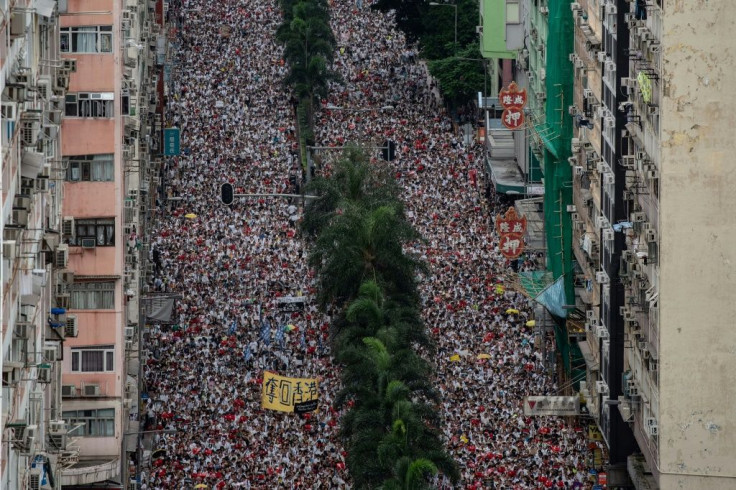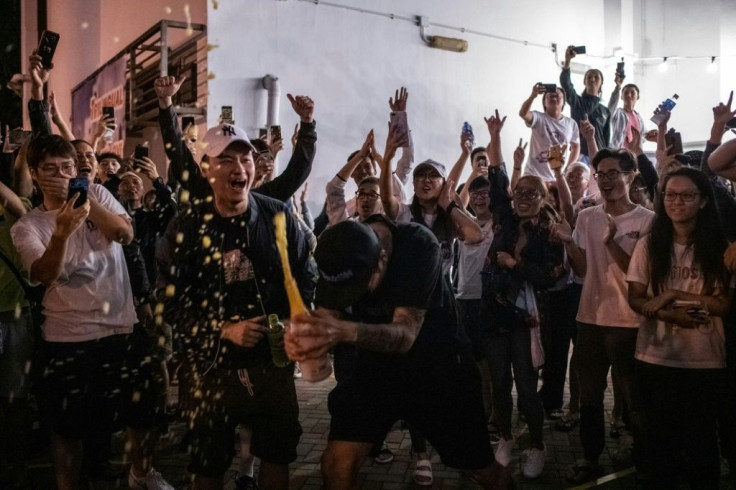Hong Kong Leader Offers Mea Culpa, But No Concessions

Hong Kong's unpopular leader Carrie Lam acknowledged Tuesday that public dissatisfaction with her government fuelled a landslide win by pro-democracy candidates in local elections, but she drew fresh criticism by offering no new concessions to resolve months of violent protests.
In China, state media sought to downplay and discredit the weekend ballot that delivered a stinging rebuke to the financial hub's pro-Beijing establishment.
Lam admitted that the district council election result revealed public concern over "deficiencies in the government, including unhappiness with the time taken to deal with" the unrest.
In a rout that stunned the semi-autonomous territory, candidates opposing control by China seized an overwhelming majority of 452 elected seats in the city's 18 district councils, bodies historically dominated by a Beijing-aligned establishment.
It was a humiliating rebuke to Beijing and Lam, who has dismissed calls for political reform and repeatedly suggested that a silent majority supported her administration.
Since the polls, pro-democracy politicians have stepped up calls for Lam to meet key demands such as direct popular elections for the city's leadership and legislature, and a probe into alleged police brutality against demonstrators.
But in her weekly press briefing, Lam sidestepped those calls, instead denouncing street violence and repeating earlier pledges to step up a cross-party dialogue on the root causes of the turmoil, proposals previously dismissed by her opponents as inadequate.

Millions of Hong Kongers marched in protest rallies earlier this year after Lam's government introduced a bill allowing extraditions to China.

It was eventually withdrawn under public pressure, but fuelled growing fears that Beijing was tightening its grip, leading to broader reform demands and violent clashes between police and protesters.
Lam's latest comments indicated "no reflection, no response and no resolution" for Hong Kong's ongoing crisis, said Lam Cheuk-ting, a lawmaker with the Democratic Party, the city's largest anti-establishment party.
"While the pro-establishment camp was finally awakened by votes, Lam still chooses to remain asleep, as deeply as in a coma," he said.
China's state media, however, cast doubt on the vote's legitimacy, focusing on violence that marred campaigning.
The People's Daily said "social unrest... has seriously disrupted the electoral process," while an editorial in the English-language China Daily said the vote was "skewed by intimidation" and "dirty tricks" that hurt pro-establishment candidates.
The electoral drubbing has revived speculation that Lam might be dumped by Beijing, but a Chinese government spokesman on Monday reiterated support for her.
Asked whether China wanted her to take responsibility for the rout, Lam said she had received no such communications from Beijing.
Officials at Hong Kong Polytechnic University, where police and protesters clashed violently more than a week ago, said they searched the entire campus Tuesday to find just one remaining holdout, raising hopes that a police siege of the campus could be nearing an end.
However, campus officials added that they could not rule out the possibility that some protesters remained hidden.
The government announced separately that the busiest road tunnel linking Hong Kong island and the city's mainland would reopen on Wednesday for the first time since November 13, when it was closed for safety reasons as unrest at the university began to escalate.
The closure added to the strain on transport in the territory, where subway lines also have repeatedly been shut down due to violent protests.
© Copyright AFP 2024. All rights reserved.





















